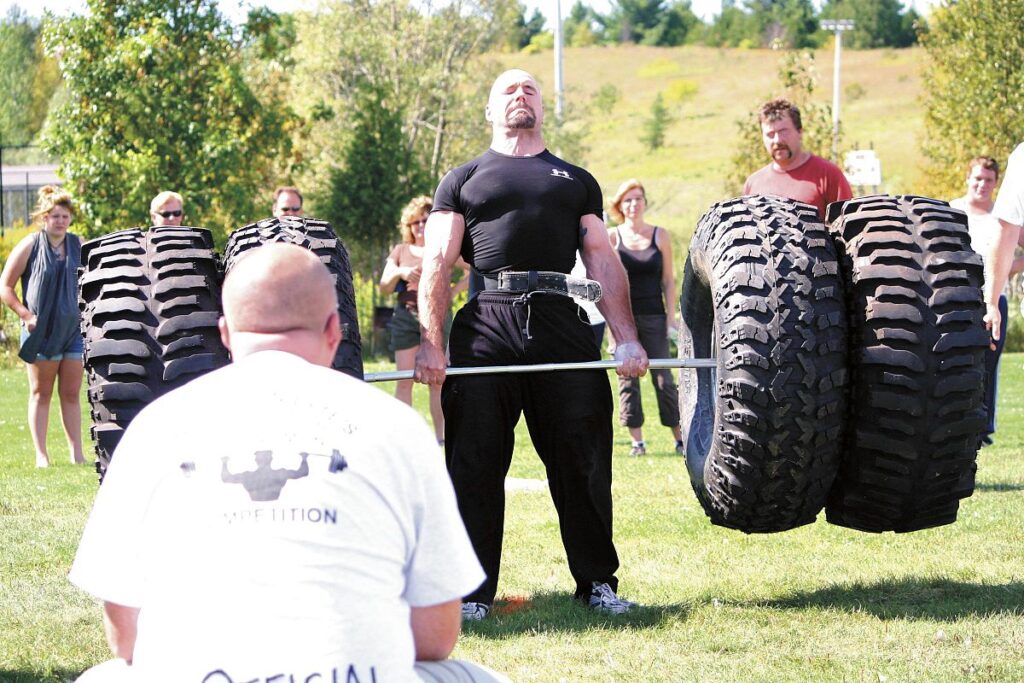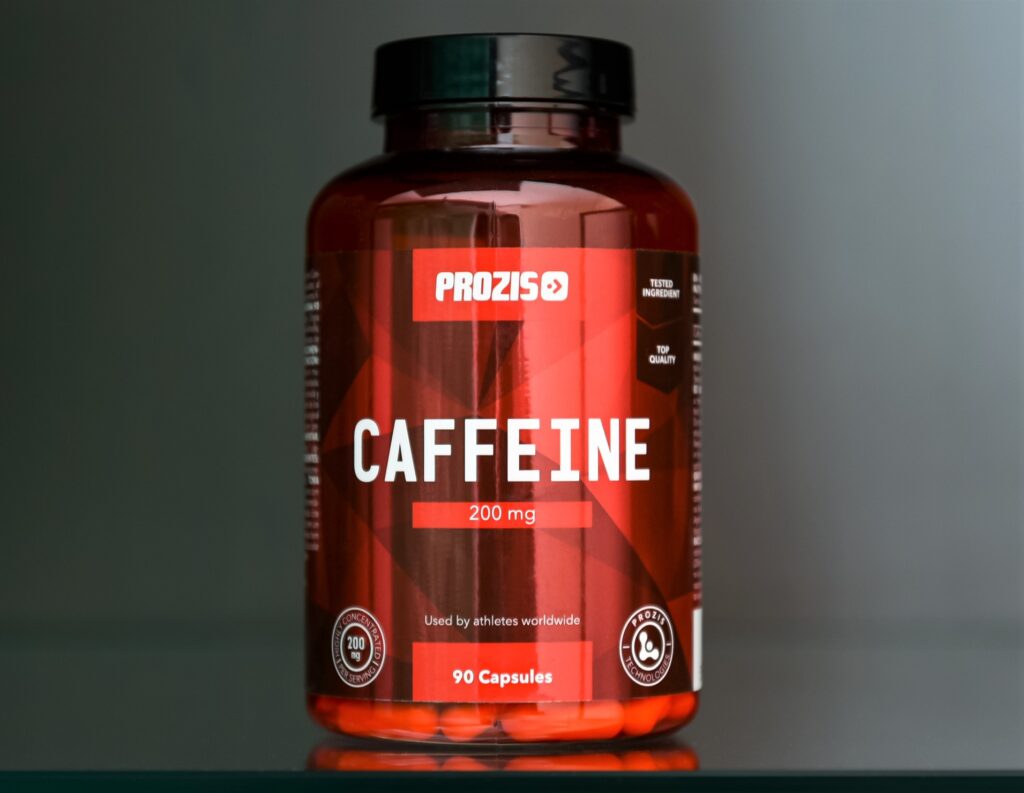Caffeine and exercise—the pairing is one of the most studied topics in sports science. One key reason is because caffeine is a “supplement” nearly every athlete ingests. It’s in coffee, tea, soda, chocolate, energy drinks, preworkouts, and on and on. It’s even in some products you wouldn’t suspect, like breakfast cereals, protein powders, and pain relievers. Let’s look at the science of caffeine and exercise and then focus particularly on weight-training to see if caffeine—cheap and frequently ingested—is the ultimate workout supplement?
CAFFEINE AND EXERCISE BENEFITS
Enhanced Physical Performance
Research has consistently shown that caffeine can enhance physical performance by reducing fatigue and increasing muscular strength and power. A meta-analysis published in Sports Medicine found that caffeine supplementation improved performance in various activities, including both endurance and high-intensity exercises (1). Caffeine helps individuals exercise at a higher intensity for longer durations, contributing to improved overall performance.

Fat Burning
Caffeine is a thermogenic. It’s been shown to enhance fat oxidation during exercise. A study reported that caffeine ingestion significantly increased fat utilization during endurance exercise (2). This effect can be advantageous for endurance athletes who rely on fat as a fuel source during prolonged activities. It also makes caffeine a good pre-cardio supplement, though the impact on overall weight loss or body composition is generally modest and will vary among individuals.
Reduced Perceived Muscle Pain
We mentioned in the introduction that caffeine is found in some over-the-counter pain relievers. Here’s why. Caffeine possesses analgesic properties that can reduce the perception of muscle pain. A study published in the Journal of Pain (ouch!) revealed that caffeine ingestion before high-intensity exercise reduced muscle pain (3). This effect may enable individuals to push through discomfort (such as the final reps of a squat) and enhance performance.
Improved Endurance Performance
One of the best documented effects of caffeine is its ability to enhance endurance performance. Several studies have shown that caffeine increases time to exhaustion and delays the onset of fatigue during long-duration exercise. A meta-analysis concluded that caffeine improves endurance performance across various exercise modalities (4).
Increased Energy and Alertness
Caffeine acts as a central nervous system stimulant, leading to increased energy levels and heightened alertness. A study demonstrated that caffeine intake improved cognitive function and reduced perceived exertion during prolonged exercise (5). This effect can be particularly beneficial for activities that require sustained mental focus and concentration. A study found a 9% advantage in chess from caffeine ingestion.

CAFFEINE AND WEIGHT-TRAINING BENEFITS
All of the above exercise benefits can be applied to weight-training, but let’s look at the science of caffeine and muscular strength.
Enhanced Muscle Contractions
Research suggests that caffeine may improve muscular force production. A study published in Medicine & Science in Sports & Exercise demonstrated that caffeine ingestion enhanced maximal voluntary strength in trained individuals (6). This effect is attributed to caffeine’s ability to enhance motor neuron activity and increase calcium release, leading to stronger muscle contractions.
Enhanced Strength and Power
Let’s cut right to the chase: Does caffeine combined with weight-training lead to better strength and power gains than caffeine-free weight-training? Yes! A meta-analysis of 10 studies demonstrated this caffeine advantage (7). Here’s the conclusion of that meta-analysis:
Caffeine appears to provide significant ergogenic effects on muscle strength and power. The expression of strength in the form of 1RM is most specific to the sport of powerlifting but may translate to performance improvements in a variety of other strength-power sports. The effects of caffeine on muscle power may apply to athletes in a variety of sports in which jumping is a predominant activity that affects the sport-specific performance. Subgroup-analyses suggested that the effects of caffeine on strength may be more pronounced in upper body muscles, but further research on this topic is warranted. The results of the present meta-analysis are based on limited evidence, and thus need to be interpreted with caution.

CAFFEINE AND EXERCISE: CONCLUSION
In 2021, the the International Society of Sports Nutrition offered a position stand on caffeine and exercise performance which says, in part:
✹ Supplementation with caffeine has been shown to acutely enhance various aspects of exercise performance in many but not all studies. Small to moderate benefits of caffeine use include, but are not limited to: muscular endurance, movement velocity and muscular strength, sprinting, jumping, and throwing performance, as well as a wide range of aerobic and anaerobic sport-specific actions.
✹ Aerobic endurance appears to be the form of exercise with the most consistent moderate-to-large benefits from caffeine use, although the magnitude of its effects differs between individuals.
✹ Caffeine has consistently been shown to improve exercise performance when consumed in doses of 3–6 mg/kg body mass. Minimal effective doses of caffeine currently remain unclear but they may be as low as 2 mg/kg body mass. Very high doses of caffeine (e.g. 9 mg/kg) are associated with a high incidence of side-effects and do not seem to be required to elicit an ergogenic effect.
✹ The most commonly used timing of caffeine supplementation is 60 min pre-exercise. Optimal timing of caffeine ingestion likely depends on the source of caffeine. For example, as compared to caffeine capsules, caffeine chewing gums may require a shorter waiting time from consumption to the start of the exercise session.
When The Barbell ranked the Best Supplements for Muscle Gain, caffeine was third behind whey protein and creatine. Whether in pill, powders, drink, gum, or food, it remains a cost-effective, easily available way of boosting your workout results. Is it the ultimate workout supplement? If you consider all the different types of workouts and exercises—from strength to endurance, from kick-boxing to chess and from swimming to stepping to squatting—yes, caffeine ranks number one.

CAFFEINE AND EXERCISE: FAQS
Is caffeine safe to consume before strength training?
Caffeine is considered safe for most individuals when consumed in moderate amounts. However, individual responses may vary. It’s important to assess your own tolerance and consider factors such as sensitivity to caffeine, pre-existing health conditions, and other medications or supplements you may be taking. Consulting with a healthcare professional can provide personalized advice based on your specific circumstances.
How much caffeine should I consume before strength training?
The optimal dosage of caffeine can vary depending on individual factors, but research suggests a range of 3-6 mg/kg of body weight consumed is ideal. So, for a 200-pound individual, this is 270 mg. to 540 mg. Most caffeine pills are 200 mg., so experiment with one or two. Many pre-workout blends combine caffeine with other stimulants like yohimbine, theobromine, and theacrine, so keep that in mind when reading ingredients and dosages. Also note that another popular supplement, green tea extract, also typically contains caffeine (some is decaffeinated), and the amount can vary greatly from one brand to another. Read the label carefully.

When should I ingest the caffeine?
If it’s a pill or powder, approximately 30-60 minutes before exercise. Drinks, foods, and gum may take longer or shorter to take effect. It’s advisable to start with a lower dose and gradually increase if needed, while monitoring your response to caffeine. Also, be conscious of the afterlife of caffeine and its effect on your sleep and recovery. Avoid ingesting more than 200 mg. less than six hours before bed.
For more on the caffeine and recovery, check out The Afterlife of Caffeine
Does caffeine improve strength immediately after consumption?
The effects of caffeine typically peak within 30-60 minutes after consumption and can last for several hours. However, the immediate impact on strength can vary among individuals. Experiment with timing to find the optimal window where you experience the desired effects during your workout.
Can regular caffeine consumption lead to dependence?
Yes. Regular and excessive caffeine consumption can lead to dependence, where your body becomes accustomed to the effects and may require higher doses to achieve the same results. Periodic breaks from caffeine consumption can help prevent dependence.
Are there any risks or side effects associated with caffeine intake?
While moderate caffeine intake is generally safe for most individuals, excessive consumption can lead to side effects such as increased heart rate, jitteriness, anxiety, gastrointestinal issues, and sleep disturbances. It’s important to be mindful of your overall caffeine intake from various sources like coffee, tea, energy drinks, and supplements to avoid exceeding safe limits.
Sources
1. Grgic J, Mikulic P, Schoenfeld BJ, et al.,”The influence of caffeine supplementation on resistance exercise: a review,” Sports Med. 2019;49(1):17-30.
2. Spriet LL., “Exercise and sport performance with low doses of caffeine,” Sports Med. 2014;44 Suppl 2(Suppl 2):S175-84.
3. Maridakis V, O’Connor PJ, Dudley GA, McCully KK., “Caffeine attenuates delayed-onset muscle pain and force loss following eccentric exercise,” J Pain. 2007;8(3):237-43.
4. Grgic J, Pickering C, Bishop DJ, Del Coso J, Schoenfeld BJ, Tinsley GM, et al., “Caffeine supplementation for powerlifting competitions: a narrative review,” J Caffeine Adenosine Res. 2020;10(2):41-51.
5. Graham TE., “Caffeine and exercise: metabolism, endurance, and performance,” Sports Med. 2001;31(11):785-807.
6. Kalmar JM, et al., “Caffeine increases skeletal muscle force and power output during concentric contractions,” Med Sci Sports Exerc. 2005 Jul;37(7):1145-50.
7. Grgic, Jozo, et al., Effects of caffeine intake on muscle strength and power: a systematic review and meta-analysis, J Int Soc Sports Nutr. 2018; 15:11. link
















































